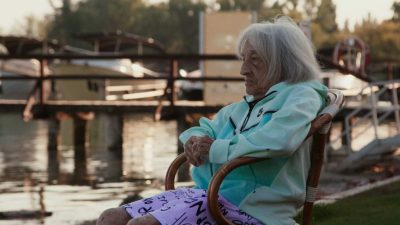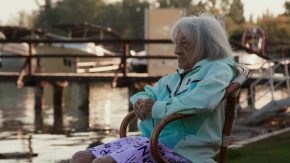“The Pod Generation” is a thought-provoking Belgian/French/UK co-production, directed and written by Sophie Barthes (Cold Souls). Released as an independent film in 2023, it boasts a star-studded cast with Emilia Clarke (Me Before You) and Chiwetel Ejiofor (12 Years a Slave) in the lead roles. This sci-fi drama delves into a not-so-distant future where technology and tradition clash in the lives of a couple in their 30s, Alvy and Rachel.
The movie’s premise revolves around Alvy (Ejiofor), an advocate for all things natural and traditional, who teaches holographic planting, and Rachel (Clarke), a career-driven woman offered a promotion but yearning for motherhood instead. Rachel secretly adds her name to the Womb Centre’s waiting list, setting the stage for a conflict of ideologies within their relationship.
In this futuristic world, the Womb Centre offers a unique and expensive solution: pod babies. These portable, egg-like pods allow babies to develop while both women and men carry them during pregnancy. It’s a choice, not a necessity, driven by conformity, promising no swollen ankles, stretch marks, or significant weight gain – a seductive proposition in this hyper-progress-driven society.
The film opens with an engaging intro that subtly introduces viewers to the advancements of this world. Rachel’s AI assistant, Elena, provides updates on her serotonin levels, controls the clock and lighting in her kitchen, and showcases the extent of automation in her morning routine. While some aspects of life remain familiar, the film underscores the price of such technological progress, highlighting a sense of isolation, a disconnect from nature, and our primal origins, which isn’t exactly soothing.
Visually, the film’s color palette is reminiscent of 2019’s independent hit “The Assistant,” and it effectively conveys the sterile, corporate world that Rachel inhabits. As the characters navigate this brave new world, conversations casually include references to NFT trades, follower numbers, and work-outs done during office hours, reflecting the natural integration of these elements into daily life.
However, “The Pod Generation” occasionally becomes a bit too on-the-nose in its exploration of its themes. Alvy’s impassioned speech about humanity’s dissociation from nature feels somewhat forced, lacking subtlety and subtext. The film’s relentless meditation on technological progress, traditional gender roles, and consciousness can overshadow the characters’ complexity and overly simplify the plot.
Despite these moments of heavy-handedness, the film is beautifully composed, benefiting from the talents of actors like Ejiofor, who strive to inject real human depth into the script. Their efforts occasionally succeed, allowing viewers to connect with the characters on a personal level, even as they grapple with larger societal issues.
“The Pod Generation” is an ambitious and timely story, particularly as AI threatens to displace millions of jobs and digitalization boosts our anxieties while eroding our interpersonal skills. The film sheds light on the perils of a society obsessed with progress and conformism. However, its numerous direct references to the same topic create a vacuum that consumes much of the story’s potential for fun and satire.
What ultimately makes the film engaging is its constant outburst of creativity and the warmth that Clarke and Ejiofor bring to their characters. Their chemistry helps to anchor the film, making it easier for the audience to invest in their struggles and triumphs.
In conclusion, “The Pod Generation” is a visually compelling and thought-provoking exploration of a not-so-distant future where technology and tradition collide. While the film occasionally succumbs to heavy-handedness in its thematic exploration, it remains an ambitious narrative that offers plenty of food for thought. “The Pod Generation” serves as a cautionary tale, urging us to consider the price we pay for progress and the importance of staying connected to our human roots, connections and nature.
You can buy or rent “The Pod Generation” on iTunes, Amazon, Google Play and Vudu.
~ by Dora Endre ~



























Comments